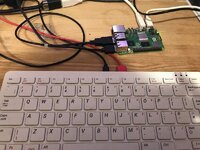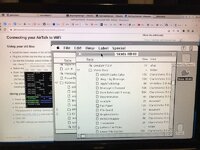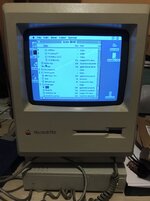Snial
Well-known member
I thought I'd share my little journey of getting AirTalk to work between my Plus & miniVMac on my π5. OK, so firstly, yes I'm fortunate enough to have one of those, as-yet-rare 5's (4GB RAM, because hey - who needs more ;-) ) thanks to a leaving present from the most recent company I was working at: ByteSnap in Longbridge, Birmingham, UK. It took a while to arrive, delays almost worthy of Sinclair in the early 1980s and at one point I thought it was going to arrive in January, but then it did an unBrexit & got posted a couple of weeks ago. I then had to order an micro HMDI adapter, a power plug for good measure & I took the opportunity to order a 32GB µSD.

Naturally, the most important thing to do with a Raspberry PI is to run a Macintosh Emulator on it. In the past I've managed to get the excellent PCE/MacPlus emulator to work on my PI 3, but for simplicity's sake (and because I understood it could work with miniVMac via the AirTalk threads), I decided to install that and, for fun I decided to compile it myself. I started with the standard Version 36.04 but found that it wouldn't support the -lt -lto udp setup option, so I then found the 'Beta' 37.03. I built the setup tool as normal (gcc setup/tool.c -o setup_t) and then ran this setup:
./setup_t -t larm -m Plus -speed z -lt -lto udp > setup.sh
sh setup.sh (because I can't be bothered to chmod)
make -j4 (because the PI 5 is fast and I mustn't waste those MIPs :-O )
I have a standard 40MB HD image with System 7.0.1 and my standard tools (i.e. ClarisWorks 3, WriteNow 2.0, Think C 5, Compact Pro & Stuffit Lite). There's plenty of space on it for my projects, because well, 40MB is enough for anyone!
Then I went over to the very helpful AirTalk Getting Started page and followed the instructions. Currently I've had to transfer data between my Macs in a fairly convoluted way. Either I've transferred from my Intel Mac mini via a CF card to my PowerBook 1400c and then via my SCSI ZIP 100 to my Mac Plus, which involved some unplugging and plugging in (unwise); or I've run miniVMac on my PI 3 and then transferred to my USB ZIP 250 to my SCSI ZIP 100. More recently I've been playing with AppleTalk between my PB 1400c and my Mac Plus, which involved a trip down my guesswork memory lane.
So, here's the thing: very wonderfully I was able to obtain a couple of AirTalk units from the eminent @cheesestraws at the recent fab & fun UK Meetup at the middle of November. I knew they were great, but you might find this hard to grasp, but at first I struggled to see how I was going to use them, because at the moment I need just one cable to hook up my PB1400c to my Plus and a pair of AirTalks needs 2 + 2x PSUs.
But when I finally got around to reading the original AirTalk thread I finally realised that I could directly get an emulator on my PI to talk to my real Plus. I think the other level of confusion was that I was told at the Meetup that AirTalk didn't really connect to a proper IP network, nor netatalk and so I had imagined that it was just some ESP32 to ESP32 wireless comms (like they ran their own AP to do it).
Hence when I finally did get it, I was pretty keen to get it going. And it works quite nicely - first time in fact! Thanks everyone for making it easy (despite my best efforts ;-) ) ! Of course I had to use the Zip drives to copy the Chooser Extension to the Plus (Stuffit Lite and Drop Stuff for System 7.1 both work) but then the experience of setting up Wifi on the Plus was a real joy: like a bit of 21st century inserted straight into the late 80s! After a reboot and running the Sharing control panel to start file sharing, it was ready to be tested.
Then I switched to miniVMac on the PI 5 (which already had AppleTalk on); starting AppleShare from its Chooser led me to being able to select my Mac Plus server (called Plus) and from there mount Skids HD40.

I copied a few small files in both directions. It's great fun and somewhat magically surreal. As has been reported quite a bit, the initial file transfer setup took quite a while (about 30s to a minute), but after that file transfers were fast enough for my needs.
So, a great success! What it means is that I can simplify my emulated Mac to Mac Plus file transfer setup as I just need e.g. the PI 5, the Plus, a HD and AirTalk. I'll use it for developing a few simple apps on miniVMac and transfer them to the Plus for authenticity!

-cheers all!
PS. I might go back to using PCE/MacPlus for the very simple reason that that emulator instruction loop runs at a much finer granularity (1ms by default, but I got it down to 0.5ms on the PI 3 instead of 16.7ms on miniVMac) and the JavaScript version now apparently supports AppleTalk. So maybe that can be back ported to the main code base in C and it'd massively reduce the latency.

Naturally, the most important thing to do with a Raspberry PI is to run a Macintosh Emulator on it. In the past I've managed to get the excellent PCE/MacPlus emulator to work on my PI 3, but for simplicity's sake (and because I understood it could work with miniVMac via the AirTalk threads), I decided to install that and, for fun I decided to compile it myself. I started with the standard Version 36.04 but found that it wouldn't support the -lt -lto udp setup option, so I then found the 'Beta' 37.03. I built the setup tool as normal (gcc setup/tool.c -o setup_t) and then ran this setup:
./setup_t -t larm -m Plus -speed z -lt -lto udp > setup.sh
sh setup.sh (because I can't be bothered to chmod)
make -j4 (because the PI 5 is fast and I mustn't waste those MIPs :-O )
I have a standard 40MB HD image with System 7.0.1 and my standard tools (i.e. ClarisWorks 3, WriteNow 2.0, Think C 5, Compact Pro & Stuffit Lite). There's plenty of space on it for my projects, because well, 40MB is enough for anyone!
Then I went over to the very helpful AirTalk Getting Started page and followed the instructions. Currently I've had to transfer data between my Macs in a fairly convoluted way. Either I've transferred from my Intel Mac mini via a CF card to my PowerBook 1400c and then via my SCSI ZIP 100 to my Mac Plus, which involved some unplugging and plugging in (unwise); or I've run miniVMac on my PI 3 and then transferred to my USB ZIP 250 to my SCSI ZIP 100. More recently I've been playing with AppleTalk between my PB 1400c and my Mac Plus, which involved a trip down my guesswork memory lane.
So, here's the thing: very wonderfully I was able to obtain a couple of AirTalk units from the eminent @cheesestraws at the recent fab & fun UK Meetup at the middle of November. I knew they were great, but you might find this hard to grasp, but at first I struggled to see how I was going to use them, because at the moment I need just one cable to hook up my PB1400c to my Plus and a pair of AirTalks needs 2 + 2x PSUs.
But when I finally got around to reading the original AirTalk thread I finally realised that I could directly get an emulator on my PI to talk to my real Plus. I think the other level of confusion was that I was told at the Meetup that AirTalk didn't really connect to a proper IP network, nor netatalk and so I had imagined that it was just some ESP32 to ESP32 wireless comms (like they ran their own AP to do it).
Hence when I finally did get it, I was pretty keen to get it going. And it works quite nicely - first time in fact! Thanks everyone for making it easy (despite my best efforts ;-) ) ! Of course I had to use the Zip drives to copy the Chooser Extension to the Plus (Stuffit Lite and Drop Stuff for System 7.1 both work) but then the experience of setting up Wifi on the Plus was a real joy: like a bit of 21st century inserted straight into the late 80s! After a reboot and running the Sharing control panel to start file sharing, it was ready to be tested.
Then I switched to miniVMac on the PI 5 (which already had AppleTalk on); starting AppleShare from its Chooser led me to being able to select my Mac Plus server (called Plus) and from there mount Skids HD40.

I copied a few small files in both directions. It's great fun and somewhat magically surreal. As has been reported quite a bit, the initial file transfer setup took quite a while (about 30s to a minute), but after that file transfers were fast enough for my needs.
So, a great success! What it means is that I can simplify my emulated Mac to Mac Plus file transfer setup as I just need e.g. the PI 5, the Plus, a HD and AirTalk. I'll use it for developing a few simple apps on miniVMac and transfer them to the Plus for authenticity!

-cheers all!
PS. I might go back to using PCE/MacPlus for the very simple reason that that emulator instruction loop runs at a much finer granularity (1ms by default, but I got it down to 0.5ms on the PI 3 instead of 16.7ms on miniVMac) and the JavaScript version now apparently supports AppleTalk. So maybe that can be back ported to the main code base in C and it'd massively reduce the latency.
